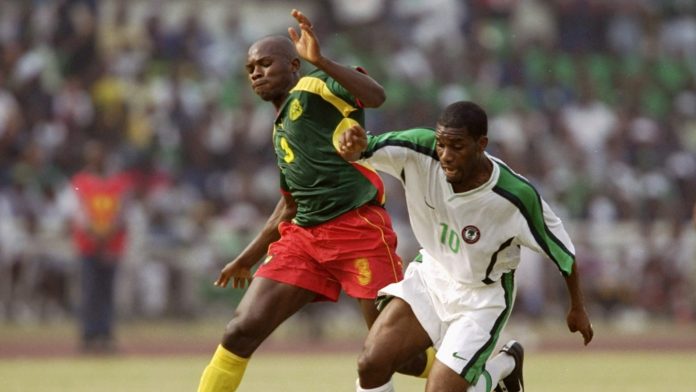|
Getting your Trinity Audio player ready...
|
It couldn’t get any bigger, could it?
Nigeria versus Cameroon — arguably the biggest grudge match at the Africa Cup of Nations — is on the menu again, some 15 years after it was last served.
The Super Eagles have no shortage of rivals, of course, being the big boys they are; Ghana is one, South Africa another. Still, as is explained by Tolu Olasoji — a Nigerian freelance journalist and African football contributor to UK-based magazine FourFourTwo — the rivalry Nigeria contests with Cameroon runs along deeper lines, especially in the context of the Nations Cup.
“There is a whole lot more between Cameroon and Nigeria than bloody tussles to determine the rightful custodian of the Bakassi Peninsula, situated at the extreme eastern end of the Gulf of Guinea, along a shared 1,600-kilometer land borderline — which keeps blurring,” Olasoji says.
“And sincerely,” he continues, “three painful defeats to Cameroon at the Afcon reduces Nigeria’s age-old ‘beefs’ with Ghana and South Africa to little more than petty obsessions.”

The two countries are indeed bound by geography — a claim neither Ghana nor South Africa has — along with a sometimes-explosive cocktail of politics and culture. From that bond, though, springs a fiery feud, one that is at its most intense when spread across a football pitch. There is hardly a fixture more captivating in all Afcon history, and the latest installment — a Round of 16 clash at Egypt 2019 — should revive the old flame.
Already, the two sides have clashed six times at the tournament, the first happening in 1984. The occasion was that edition’s final in Abidjan, when the Cameroonians roused themselves from an early Muda Lawal goal down to record a 3-1 victory which brought a maiden Afcon triumph. Cameroon’s next two titles also came directly at the old enemy’s expense: in 1988 when Emmanuel Kundé’s spotkick conversion proved decisive (the pair had previously met in the group stage, playing out a draw), and at the turn of the century when Cameroon’s shootout victory ruined Nigeria’s grand owambe of a final in Lagos.
In return, what Nigeria has claimed in Afcon encounters with Cameroon was bronze at Senegal ’92, and, en route to another third place finish, the spoils from a quarter-final meeting in 2004 — scant consolation, surely.
Generally, Nigeria has been the more dominant side in a match-up that goes back nearly six decades. The Eagles hog the head-to-head stats, having only ever suffered four losses to Cameroon (as Olasoji mentioned at the outset), three of which have been accounted for above. It goes to show, then, that Nigeria struggle to get anything off Cameroon at the continental showpiece, especially when the stakes are highest.

To explain away some of those woes, Nigerians would tell you about how Henry Nwosu’s header in the ’88 final — had it not been wrongfully disallowed — could have yielded a different outcome. And, on the streets of Surulere, tales are told rather ruefully of how, in the modern VAR era, the Victor Ikpeba penalty which bounced just over the goal-line at the now out-of-use National Stadium would have been adjudged fairly.
Those were the times, of course: times when Cameroon and Nigeria were the biggest forces on the continent, when the former seemed almost invincible and the latter hardly ever returned from the tournament empty-handed. These days, the well has run a bit dry for both. Yes, they share two of the last three Afcon titles, but each of those successes felt more accidental than some proof of genuine majesty. Cameroon weren’t at the Afcon when Nigeria won it in 2013, for instance, and when the Indomitable Lions claimed the honours four years later, their next-door neighbor didn’t turn up for the party. Altogether, between them, they have missed five finals in the last seven years.
Things have thawed, understandably, but they get icy again on July 6 in Alexandria. Cameroon are out to defend their only Afcon crown since 2002, and Nigeria would want to prove that their latest generation under Gernot Rohr is capable of much more than one not-so-memorable Fifa World Cup campaign. However you look at it — and however much standards have dropped on either side after the golden noughties — this could be a classic. Heck, it’s always been.
Bring it on!
Sammie Frimpong — Daily Mail GH





